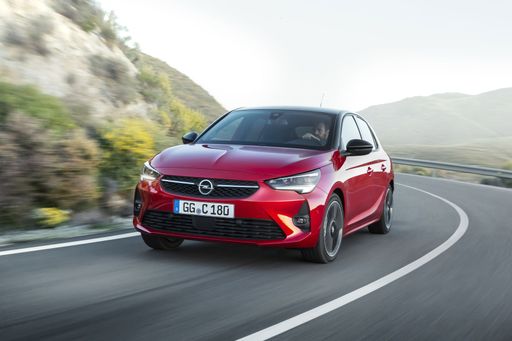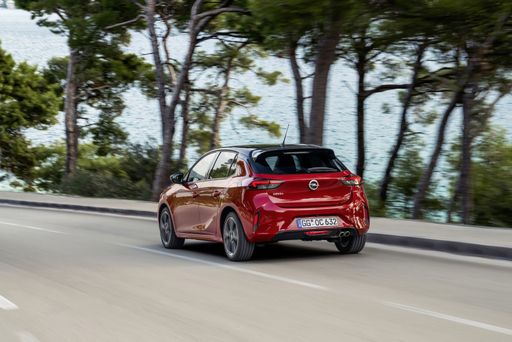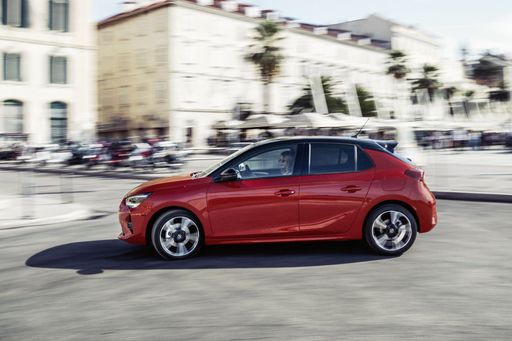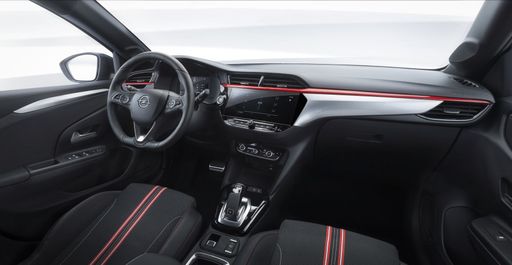Toyota C-HR VS Vauxhall Corsa – Specs, Efficiency & Price Comparison
Find out now which car fits your needs better!
The Toyota C-HR (SUV) is powered by a Full Hybrid or Plugin Hybrid engine and comes with a Automatic transmission. In comparison, the Vauxhall Corsa (Hatchback) features a Petrol, Electric or Petrol MHEV engine and a Manuel or Automatic gearbox.
When it comes to boot capacity, the Toyota C-HR offers 447 L, while the Vauxhall Corsa provides 309 L – depending on what matters most to you. If you’re looking for more power, you’ll need to decide whether the 223 HP of the Toyota C-HR or the 156 HP of the Vauxhall Corsa suits your needs better.
There are also differences in efficiency: 0.80 L vs 14.20 kWh4.60 L. In terms of price, the Toyota C-HR starts at 29100 £, while the Vauxhall Corsa is available from 19400 £.
Compare all the key specs now and find out which model fits your lifestyle best!
Toyota C-HR
The Toyota C-HR stands out with its distinctive and bold design that combines sleek, angular lines with a sporty posture. Its comfortable and stylish interior is equipped with advanced technology features, providing a seamless driving experience. The vehicle offers impressive handling and performance, making it a compelling choice for those who appreciate a blend of practicality and flair on the road.
details @ Toyota
@ Toyota
 @ Toyota
@ Toyota
 @ Toyota
@ Toyota
 @ Toyota
@ Toyota
 @ Toyota
@ Toyota
Vauxhall Corsa
The Opel Corsa continues to be a strong contender in the compact car market, offering a blend of stylish design and practicality. Its interior is thoughtfully laid out, providing drivers with a comfortable and engaging experience, while the technology on offer ensures connectivity and ease of use. With its efficient performance and reputation for reliability, the Corsa remains a popular choice for urban and suburban motoring needs.
details @ media.stellantis.com
@ media.stellantis.com
 @ media.stellantis.com
@ media.stellantis.com
 @ media.stellantis.com
@ media.stellantis.com
 @ media.stellantis.com
@ media.stellantis.com

|

|
|
|
|
Costs and Consumption |
|
|---|---|
|
Price
29100 - 42800 £
|
Price
19400 - 28600 £
|
|
Consumption L/100km
0.8 - 5.1 L
|
Consumption L/100km
4.6 - 5.7 L
|
|
Consumption kWh/100km
-
|
Consumption kWh/100km
14.2 - 15.7 kWh
|
|
Electric Range
68 km
|
Electric Range
357 - 429 km
|
|
Battery Capacity
-
|
Battery Capacity
46 - 51 kWh
|
|
co2
17 - 115 g/km
|
co2
0 - 128 g/km
|
|
Fuel tank capacity
43 L
|
Fuel tank capacity
44 L
|
Dimensions and Body |
|
|---|---|
|
Body Type
SUV
|
Body Type
Hatchback
|
|
Seats
5
|
Seats
5
|
|
Doors
5
|
Doors
5
|
|
Curb weight
1505 - 1755 kg
|
Curb weight
1175 - 1544 kg
|
|
Trunk capacity
350 - 447 L
|
Trunk capacity
267 - 309 L
|
|
Length
4362 mm
|
Length
4061 mm
|
|
Width
1832 mm
|
Width
1765 mm
|
|
Height
1558 - 1564 mm
|
Height
1435 mm
|
|
Payload
375 - 425 kg
|
Payload
376 - 445 kg
|
Engine and Performance |
|
|---|---|
|
Engine Type
Full Hybrid, Plugin Hybrid
|
Engine Type
Petrol, Electric, Petrol MHEV
|
|
Transmission
Automatic
|
Transmission
Manuel, Automatic
|
|
Transmission Detail
-
|
Transmission Detail
Schaltgetriebe, Automatikgetriebe, Automat. Schaltgetriebe (Doppelkupplung)
|
|
Drive Type
Front-Wheel Drive, All-Wheel Drive
|
Drive Type
Front-Wheel Drive
|
|
Power HP
140 - 223 HP
|
Power HP
100 - 156 HP
|
|
Acceleration 0-100km/h
7.4 - 9.9 s
|
Acceleration 0-100km/h
7.9 - 10.8 s
|
|
Max Speed
175 - 180 km/h
|
Max Speed
150 - 210 km/h
|
|
Torque
-
|
Torque
205 - 260 Nm
|
|
Number of Cylinders
4
|
Number of Cylinders
3
|
|
Power kW
103 - 164 kW
|
Power kW
74 - 115 kW
|
|
Engine capacity
1798 - 1987 cm3
|
Engine capacity
1199 cm3
|
General |
|
|---|---|
|
Model Year
2024 - 2025
|
Model Year
2023 - 2025
|
|
CO2 Efficiency Class
C, B
|
CO2 Efficiency Class
D, A, C
|
|
Brand
Toyota
|
Brand
Vauxhall
|
Toyota C-HR
Revolutionising the Crossover Segment: The Toyota C-HR
The Toyota C-HR has firmly established itself as a standout contender in the compact crossover segment. Known for its distinct design and hybrid capabilities, the C-HR continues to prioritise innovation and efficiency. In this article, we delve into the technical details that make the 2024 iteration a compelling choice for discerning buyers.
Distinctive Design and Aerodynamics
The Toyota C-HR boasts a striking design that combines angular lines with modern aesthetics. This isn't merely for show; the design enhances aerodynamics, improving fuel efficiency and handling. With dimensions of 4362mm in length and a sophisticated structure, the C-HR strikes a balance between urban agility and on-road stability.
Impressive Hybrid Powertrains
The C-HR lineup offers innovative hybrid and plug-in hybrid drivetrain options. The full hybrid system is tailored for those who seek both economic and environmental benefits. It combines a petrol engine with an electric motor to deliver power outputs ranging from 140 to 223 PS, achieving remarkable fuel consumption rates from 0.8 to 5.1 L/100km. The 2.0 Plug-In Hybrid variant impresses with an electric range of 67 km, ideal for urban commuters.
Unmatched Efficiency and Performance
Acceleration figures for the C-HR range from 7.4 to 9.9 seconds to reach 0-100 km/h, ensuring a responsive driving experience. Maximum speeds between 175 and 180 km/h cater to those who appreciate a bit of zest on the open road. Coupled with CVT automatic transmission and both front-wheel and all-wheel-drive configurations, the C-HR adapts to various driving conditions with ease.
Advanced Technology and Features
Inside, the C-HR is equipped with the latest technology aimed at providing connectivity and comfort. The model hosts an array of features across its diverse trim levels, including Business Edition, Lounge, and the sporty GR SPORT. Each variant is designed to meet the demands of different lifestyles, ensuring there's a C-HR model to suit every taste.
Sustainability and Cost Efficiency
With CO2 emissions ranging from 19 to 115 g/km, the C-HR stands as a testament to Toyota's commitment to sustainability. Financially savvy consumers will also appreciate the running cost, with monthly expenses from €959 to €1204, and a cost per km as low as 38.4 cents. Such efficiency makes the vehicle an attractive option for eco-minded buyers.
Conclusion: A Forward-Thinking Choice
The 2024 Toyota C-HR embodies Toyota's forward-thinking approach to automotive innovation, blending eco-friendly hybrid technologies with stylish design and practicality. It offers a glimpse into the future of driving, where efficiency meets elegance. Whether you're a city dweller or an adventure seeker, the C-HR promises a driving experience that is both enjoyable and environmentally conscious.
Vauxhall Corsa
The Opel Corsa: A Compact Yet Mighty Hatchback
The Opel Corsa has been a staple in the automotive market for years, offering a practical and efficient solution for those seeking a compact vehicle. With the latest models, Opel continues to push the boundaries of innovation, while maintaining the Corsa's legacy of reliability and affordability.
Under the Hood: Diverse Engine Options
The Opel Corsa comes equipped with a variety of engine options to cater to diverse driving needs. From traditional petrol engines to the more environmentally conscious hybrid and fully electric variants, drivers can choose according to their preferences and requirements. The petrol engines are powered by a robust 1.2-litre engine, offering horsepower ranging from 75 to 130 PS, combined with a commendable fuel efficiency of 4.6 to 5.7 L/100km.
For those prioritising eco-friendliness and lower running costs, the electric version of the Corsa boasts a 50 kWh battery, capable of delivering a range between 354 to 405 km on a single charge, depending on the model chosen. The electric version impresses with a consumption of just 14.6 to 15.8 kWh/100km, offering a smooth and quiet ride while reducing your carbon footprint.
High Performance Meets Efficiency
No matter the engine choice, performance is a given with the Corsa range. The acceleration from 0-100 km/h varies from 7.9 to 13.2 seconds, providing the driver with a responsive and agile driving experience. With a maximum speed stretching from 150 to 210 km/h and torque values between 118 to 260 Nm, you can navigate through city streets and highways with ease and confidence.
Impressive Technical Innovations
The Opel Corsa is not just about performance. It also incorporates a slew of technical innovations designed to enhance the driving experience. From sophisticated infotainment systems that keep you connected to advanced safety features that ensure peace of mind. These systems offer seamless connectivity options and provide real-time vehicle updates to keep you informed about your car's health.
Efficiency and Practicality Combined
The Opel Corsa manages to blend efficiency with practicality seamlessly. With spacious seating for five passengers and a boot space ranging from 267 to 309 litres, it's well-suited for both daily commutes and longer road trips. The car's compact dimensions, with a length of 4061 mm, width of 1765 mm, and height of 1435 mm, facilitate easy parking and manoeuvring in urban environments, without compromising on passenger comfort.
Conclusion: The Perfect Urban Companion
In conclusion, the Opel Corsa remains a leading choice for those seeking a compact hatchback that combines style, performance, and innovation. Its varied engine options cater to both the eco-conscious and those seeking a bit more power, while its technological advancements keep it at the forefront of modern automotive design. Whatever your preference, the Opel Corsa promises a driving experience that is both satisfying and efficient.
The prices and data displayed are estimates based on German list prices and may vary by country. This information is not legally binding.
